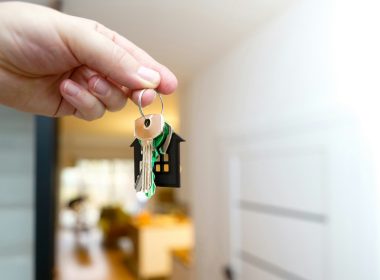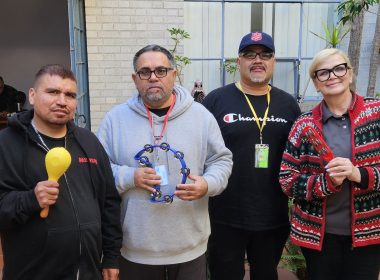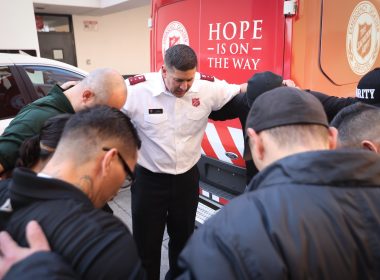Opinion
Our Job: Rescue • Feed • Clothe • House
SUPPLIES–Major Roland Sewell (top) helps unload a truck filled with Salvation Army supplies.
by Robert Docter –
Varying belief systems concerning the nature of God and how he should be worshipped held by people living in close proximity with a long history of distrust, animosity and hatred seem to spawn most conflicts within the world. I thought Jesus dealt with this issue when he answered the question: “Who is my neighbor?” His answer sprang from a story in which a Samaritan with a different belief system helps a distressed Jew. Two different cultures–different ethnicity–different religions. We conclude, therefore, that Christian love is determined by the quality of our relationships with those significantly different from us. We are all each other’s neighbor.
That kind of neighborliness is not demonstrated by Serbian Christians in Kosovo.
The ethnic eradication and forced exodus of Muslim Albanians from their homes in Kosovo has precipitated a response from NATO which has the world poised on the brink of war.
The moral question of whether or not war should ever be labeled “just” confronts the world once again. With the problems of Kosovo, we find ourselves locked on the horns of a dilemma. Some might pose the dilemma with the question: “Is it just to attempt to rescue someone from an attacker when you, yourself, are not in jeopardy of an attack?” Others might ask: “Should bombs be used as the means to stop genocide?” What is right action?
Confronting a moral dilemma requires one to examine the values implied within the question. The values in conflict in the instance of NATO action in Kosovo seem to be life vs. property–that’s Kosovar life vs. Serbian acquisition of property. Another way the dilemmas might be expressed is Kosovar life vs. Serbian ethnicity. Western culture tends to value life over other factors and holds that it is just to punish individuals who unjustly commit crimes or take the lives of others. Shaw Clifton, in Strong Doctrine, Strong Mercy, points out that there are limits to retributive punishment–namely that it must be tied into a finding of guilt and that it must be administered only in proportion to the gravity of the offense committed.
I believe there is sufficient evidence to hold that the extent of ethnic “cleansing” of the Muslim populations of Kosovo, Croatia and Bosnia by Serbian officials has reached genocidal proportions, that this population is deserving of support from peoples who hold human life sacred, and that following the failure of lesser remedies, the physical punishment of the Serbian military and its guerrilla henchman is justified.
I also believe one must be somewhat conversant with the issues of the conflict prior to forming a conclusion. When the issues involve conflict among cultural groups and nations, it is also essential to have some insight into history. In the case of the Balkan states, this history is very complex.
In 1987, Slobodan Milosovic, Communist leader of Serbia, chose Kosovo, an autonomous sub-region of the Yugoslav Federation on the south-west corner of Serbia, as the site for a speech designed to inflame the cause of Serbian nationalism within the entire Baltic region. Serbia is primarily Orthodox Christian with an additional 10 percent Roman Catholic and one percent Protestant and Muslim. In Kosovo at the time of the speech, Serbs represented a minority of approximately 10 percent of the Kosovars, the remaining being Albanian. Milosovic’s goal, it seems, was to overpower non-Serbs within the region and assume control of a new land. The speech focused on misstatements concerning the role of Albania in the 14th century fall of the Ottoman empire to the Turks and reminders for the Serbs of alleged atrocities committed by Albanians prior to and during World War I. Albania is 70 percent Muslim, 20 percent Orthodox Christian and 10 percent Roman Catholic. We need to remember that regional conflict in the Baltic States spawned World War I with the assassination of Archduke Francis Ferdinand, heir to the Austro-Hungarian throne, by a Serb nationalist in June of 1914. Austria-Hungary attacked Serbia, various alliances fell into place, and Europe found itself at war.
As that war ended and the Austro-Hungarian empire disintegrated, the nation of Yugoslavia emerged among the south Slavs who had been able to put aside their religious and cultural differences for a very brief period in order to achieve a measure of independence. The Serbs dominated the new nation’s decision making process. The coalition has never been strong and has been led by a dictatorial strongman almost from its inception. Milosovic follows in that tradition.
With Milosovic’s emphasis on Serbian nationalism, other ethnic groups in the region also became more nationalistic. Croatia and Bosnia-Herzegovina, primarily Muslim, reclaimed their own ethnic identities, seceded from the Yugoslav Federation and created their own Muslim Federation together. Serbia, being denied its goal of a “Greater Serbia,” initiated violent conflict. Milosovic encouraged and aided the Bosnian Serbs to “cleanse” Bosnia and Croatia by systematically eliminating Muslims. Thousands died and cities destroyed over a three year period. This plan was slowed with the Dayton Accords in 1995 and the introduction of “I-for” troops from Europe and the U.S. Next, Milosovic turned to Kosovo, with eager eyes also turned south and west to both Montenegro and Macedonia with the intent to destabilize existing governments and make them vulnerable to conquest.
Problems in Kosovo have emerged slowly to the public eye. Albania was not mentioned in the Dayton Accord. In February and March of 1998 serious concerns became evident with the rise of the Kosovo Liberation Army and its confrontations with Serbian police. Once again there was systematic slaying of Kosovo Moslem Albanians. A forced exodus followed and the KLA was dispersed. In the succeeding year, well over one million people are dislocated from their homes with close to a half million refugees seeking asylum in the neighboring countries of Albania, Montenegro and Macedonia.
NATO, a collection of 19 separate countries of Europe and the United States, has sought to slow the Milosovic plan for some time. Efforts of peaceful negotiation have collapsed. Threats of bombing fell on deaf ears. The systematic removal of Muslims from Kosovo and the murders of untold numbers was undeterred.
NATO acted with the introduction of bombing of highly selected military targets. There have been only few reports of what the Pentagon euphemistically calls “collateral damage”–the killing of innocent civilians. At this time, the results of the bombing has received mixed reviews, and it is too early to evaluate completely. It seems evident that NATO’s slow escalation of hostilities attempts to provide Milosovic with every opportunity to meet the conditions set for the resumption of peace talks. No willingness seems evident on his part, and the continuing escalation of the conflict appears likely.










